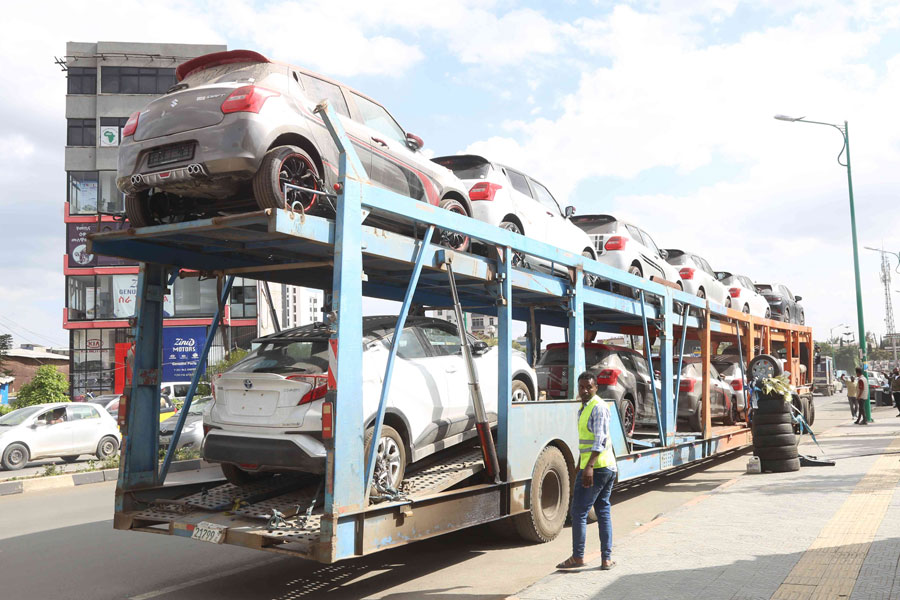
Sunday with Eden | Oct 10,2020
Jan 27 , 2024
By Todd G. Buchholz
The dream of an all-electric future is facing real-world setbacks. Despite the initial surge in enthusiasm, consumers are showing hesitance towards embracing electric vehicles (EVs). The industry is witnessing a surprising shift. Is this a temporary setback or a sign of a deeper issue with EV adoption, asks Todd G. Buchholz, a former White House director of economic policy under President George W. Bush and managing director of the Tiger hedge fund, in this commentary provided by Project Syndicate (PS).
In the early 1990s, every self-respecting American yuppie and retired suburban couple bought an electric bread maker, with sales hitting four million units. But the fad soon faded as these amateur bakers discovered that stuffing a precise quantity and ratio of flour, eggs, butter, yeast, and salt into a metal box takes time and costs much more than strolling to the corner bakery.
Are plug-in electric vehicles (EVs) the bread-makers of our day?
Despite Tesla founder Elon Musk's entrepreneurial brilliance and billions of dollars in government subsidies to support EVs, it appears that consumers still prefer to drive to a gas station for a five-minute fill-up than to retrofit their garage and suffer the range anxiety that comes from hunting for a charging station in the parking lot of an abandoned shopping mall. J.D. Power reports that 21pc of public chargers do not work in any case. As consumers start to shy away from EVs, their choice will affect not just the car industry, but US-China relations, state budgets, and commodity prices.
The evidence is rolling in fast.
This month, Hertz, which purchased 100,000 Teslas to great fanfare in 2021, executed a squealing 180-degree turn and began dumping one-third of its EV fleet, taking a 245 million dollar charge against its earnings. Its pledges to buy 175,000 EVs from GM will likely go up in smoke, too. Outside of wealthy, trendy communities, consumers are walking past plug-in EVs and snapping up hybrids and gasoline-powered engines instead.
In the fourth quarter of 2023, EV sales crawled up by 1.3pc. According to "Edmunds", EVs tend to sit on dealer lots for about three weeks longer than gasoline-powered cars. With Mercedes Benz EQS units languishing for four months, the company's chief financial officer recently acknowledged that the market is a "pretty brutal space." Customers are staying away despite a price war in which Ford, Tesla, and General Motors (GM) slashed EV prices by 20pc, on average, leading Ford to lose 36,000 dollars on each unit sold.
At the same time, state governments have been pumping EVs with enormous subsidies, even as their budgets are bleeding red. California still pours 7,000 dollars into each new EV (on top of the maximum 7,500 dollars federal credit), despite reporting a record 68 billion dollars budget deficit. Despite shrinking revenues, New Jersey sends a 4,000 dollars check to EV buyers.
How long can these states keep the money spigot open?
EV doubters like Toyota – which instead bet on hybrids – now look prescient. Over the past year, Toyota's share price outperformed GM's by 40pc. After taking flak from enthusiasts and Wall Street analysts, Toyota Chairman, Akio Toyoda, declared last October that people are "finally seeing reality." Automobile unions are relieved, considering that EVs require 90pc fewer parts and 30pc fewer manhours to manufacture.
None of this diminishes the ingenuity of EV engineers and designers. Watching smart cars race and then parallel park themselves, it is hard to believe that they were once dismissed as golf carts with hood ornaments. Musk has been called many things – some unprintable – but his cars outrun Porsches, his rockets soar past NASA's, and his brushes with insider trading leave Securities & Exchange Commission lawyers in the dust.
Still, that does not mean he always wins.
EVs face obstacles beyond physics and consumer inertia: a faulty electrical grid. More Americans today are spending more hours sitting in the dark. The US Energy Information Administration reports that between 2013 and 2021, the average blackout duration doubled, from 3.5 hours to more than seven hours, while their frequency jumped by nearly 20pc. No wonder people are reluctant to tie their mobility to a wall plug, especially given doubts about the reliability of renewable energy sources like solar and wind, which will always be vulnerable to clouds and stagnant air.
The US is not alone, of course.
China's BYD ("Build Your Dreams") automaker recently earned headlines for selling three million EVs last year, compared to Tesla's 1.8 million. Yet the wobbly Chinese economy is vulnerable to weaker US sales. The Chinese government and private sector have bet big on battery production and countries like Zimbabwe, the Democratic Republic of the Congo, Cuba, and Russia, which mine lithium, cobalt, cadmium, and other vital minerals.
But will China continue to buy off African political leaders as these commodity prices slump? How long will that spigot stay open?
The 1990s bread-machine fad never benefited from public subsidies, government mandates, or furious discounting to gain market share. If it did, perhaps it would have continued for a few more years. EVs have been promoted by presidents, governors, the IRS, and tech wizards. But the public is not listening. President Dwight D. Eisenhower, who looked great in a 60-horsepower jeep, warned that "you don't lead by hitting people over the head: that's assault, not leadership."
The internal combustion engine is still in the lead in the automobile market.
PUBLISHED ON
Jan 27,2024 [ VOL
24 , NO
1239]


Sunday with Eden | Oct 10,2020

Commentaries | May 14,2022

Fortune News | Feb 04,2023

Fortune News | May 04,2019

Commentaries | Mar 01,2024

Radar | Aug 08,2020

Fortune News | Apr 30,2022

Radar | Aug 14,2021

Fortune News | Apr 15,2023

Radar | Apr 15,2024

Photo Gallery | 178103 Views | May 06,2019

Photo Gallery | 168313 Views | Apr 26,2019

Photo Gallery | 159076 Views | Oct 06,2021

My Opinion | 137048 Views | Aug 14,2021
Commentaries | Oct 25,2025

Dec 22 , 2024 . By TIZITA SHEWAFERAW
Charged with transforming colossal state-owned enterprises into modern and competitiv...

Aug 18 , 2024 . By AKSAH ITALO
Although predictable Yonas Zerihun's job in the ride-hailing service is not immune to...

Jul 28 , 2024 . By TIZITA SHEWAFERAW
Unhabitual, perhaps too many, Samuel Gebreyohannes, 38, used to occasionally enjoy a couple of beers at breakfast. However, he recently swit...

Jul 13 , 2024 . By AKSAH ITALO
Investors who rely on tractors, trucks, and field vehicles for commuting, transporting commodities, and f...

Oct 25 , 2025
The regulatory machinery is on overdrive. In only two years, no fewer than 35 new pro...

Oct 18 , 2025
The political establishment, notably the ruling party and its top brass, has become p...

Oct 11 , 2025
Ladislas Farago, a roving Associated Press (AP) correspondent, arrived in Ethiopia in...

Oct 4 , 2025
Eyob Tekalegn (PhD) had been in the Governor's chair for only weeks when, on Septembe...

Oct 25 , 2025 . By YITBAREK GETACHEW
Officials of the Addis Abeba's Education Bureau have embarked on an ambitious experim...

Oct 26 , 2025 . By YITBAREK GETACHEW
The federal government is making a landmark shift in its investment incentive regime...

Oct 27 , 2025
The National Bank of Ethiopia (NBE) is preparing to issue a directive that will funda...

Oct 26 , 2025 . By SURAFEL MULUGETA
A community of booksellers shadowing the Ethiopian National Theatre has been jolted b...